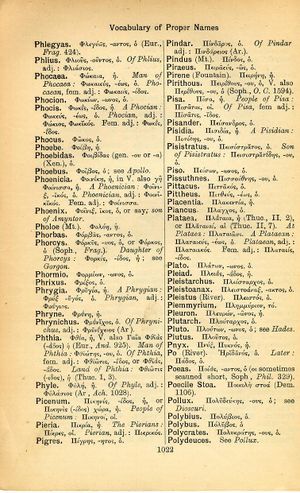Phocis
δρυὸς πεσούσης πᾶς ἀνὴρ ξυλεύεται → when the oak falls, everyone cuts wood | when an oak has fallen, every man gathers wood | on the fall of an oak, every man gathers wood | when an oak has fallen, every man becomes a woodcutter | one takes advantage of somebody who has lost his strength | one takes advantage of somebody who has lost his power | when the tree is fallen, every man goes to it with his hatchet
English > Greek (Woodhouse)
Φωκίς, -ίδος, ἡ.
A Phocian: Φωκεύς, -εως, ὁ.
Phocian, adj.: Φώκιος, Φωκικός. Fem. adj.: Φωκίς, -ίδος.
Latin > English (Lewis & Short)
Phōcis: ĭdis, f., = Φωκίς,
I the country between Bœotia and Ætolia, in which were the mountains of Parnassus and Helicon, the Castalian spring, and the river Cephisus, Mel. 2, 3, 4; Plin. 4, 3, 4, § 7; Liv. 28, 5, 16; Ov. M. 1, 313; Stat. Th. 1, 64.—
2 Transf., erroneously, in consequence of the similarity in the sound, for Phocœa: Phocide relictā, Graii, qui nunc Massiliam colunt, etc., Sen. Cons. ad Helv. 7, 8; Luc. 3, 340; 4, 256; Sid. Carm. 23, 13; Gell. 10, 16, 4.—Hence,
A Phōcenses, ium, m., the Phocians, Plin. 3, 5, 10, § 72; Just. 8, 1, 2; Sol. 2.—
B Phōcēus, a, um, adj., Phocian: rura, Ov. M. 5, 276: Anetor, id. ib. 11, 348: juvenis, Pylades, son of King Strophius of Phocis, id. Tr. 1, 5, 21.—
C Phōcĭi, ōrum m., the Phocians, Cic. Pis. 40, 96.—
D Phōcăĭcus, a, um, adj., Phocian: tellus, Ov. M. 2, 569: laurus, i. e. from Parnassus, Luc. 5, 143.
Latin > French (Gaffiot 2016)
(1) Phōcĭs,¹⁴ ĭdis, f. (Φωκίς),
1 la Phocide [partie de la Grèce, entre la Béotie et l’Étolie] : Liv. 28, 5, 16
2 Phocée : Luc. 3, 340 ; 5, 53
3 Massilie : Sid. Carm. 23, 13 || v. Phoceus.
Latin > German (Georges)
(2) Phōcis2, idis u. idos, f. (Φωκίς), Phocis, eine Landschaft des nördlichen Griechenlands zwischen Böotien u. Ätolien, Liv. 28, 5, 16. Ov. met. 1, 313 (bei Sen. ad Helv. 8, 1 [7, 8]. Gell. 10, 16, 4. Lucan. 3, 340 u. 4, 256 durch Verwechselung mit Phocaea [s. d.] fälschlich als Mutterland der Kolonie Massilia angegeben: dah. poet. = Massilia b. Sidon. carm. 23, 13). – Dav.: A) Phōcaïcus, a, um, phocisch, tellus, Ov.: manus, Lucan. – B) Phōcēnsēs, ium, m., die Einw. von Phocis, die Phocier, Liv. – C) Phōcēus, a, um (Φώκειος), aus Phocis, phocëisch, Ov.: iuvenis Phoceus u. bl. Phoceus (der Phoceer) = Pylades, Sohn des Strophius, des Königs von Phocis, Ov. – D) Phōciī, iōrum, m., die Einw. von Phocis, die Phocier, Cic. Pis. 96.

